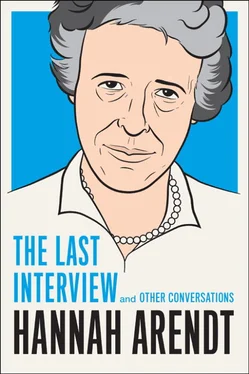ARENDT:Yes, of course. Indifference was no longer possible in 1933. It was no longer possible even before that.
GAUS:For you as well?
ARENDT:Yes, of course. I read the newspapers intently. I had opinions. I did not belong to a party, nor did I have need to. By 1931 I was firmly convinced that the Nazis would take the helm. I was always arguing with other people about it but I did not really concern myself systematically with these things until I emigrated.
GAUS:I have another question about what you just said. If you were convinced that the Nazis could not be stopped from taking power, didn’t you feel impelled actively to do something to prevent this—for example, join a party—or did you no longer think that made sense?
ARENDT:I personally did not think it made sense. If I had thought so—it is very difficult to say all this in retrospect—perhaps I would have done something. I thought it was hopeless.
GAUS:Is there a definite event in your memory that dates your turn to the political?
ARENDT:I would say February 27, 1933, the burning of the Reichstag, and the illegal arrests that followed during the same night. The so-called protective custody. As you know, people were taken to Gestapo cellars or to concentration camps. What happened then was monstrous, but it has now been overshadowed by things that happened later. This was an immediate shock for me, and from that moment on I felt responsible. That is, I was no longer of the opinion that one can simply be a bystander. I tried to help in many ways. But what actually took me out of Germany—if I should speak of that; I’ve never told it because it is of no consequence—
GAUS:Please tell us.
ARENDT:I intended to emigrate anyhow. I thought immediately that Jews could not stay. I did not intend to run around Germany as a second-class citizen, so to speak, in whatever form. In addition, I thought that things would just get worse and worse. Nevertheless, in the end I did not leave in such a peaceful way. And I must say that gives me a certain satisfaction. I was arrested, and had to leave the country illegally—I will tell you how in a minute—and that was instant gratification for me. I thought at least I had done something! At least I am not “innocent.” No one could say that of me!
The Zionist organization gave me the chance. I was close friends with some of the leading people, above all with the then president, Kurt Blumenfeld. But I was not a Zionist. Nor did the Zionists try to convert me. Yet in a certain sense I was influenced by them: especially by the criticism, the self-criticism that the Zionists spread among the Jewish people. I was influenced and impressed by it, but politically I had nothing to do with Zionism. Now, in 1933 Blumenfeld and someone whom you do not know approached me and said: We want to put together a collection of all anti-Semitic statements made in ordinary circumstances. For example, statements in clubs, all kinds of professional clubs, all kinds of professional journals—in short, the sort of thing that doesn’t become known in foreign countries. To organize such a collection at that time was to engage in what the Nazis called “horror propaganda.” No Zionist could do this, because if he were found out, the whole organization would be exposed… They asked me, “Will you do it?” I said, “Of course.” I was very happy. First of all, it seemed a very intelligent idea to me, and second, it gave me the feeling that something could be done after all.
GAUS:Were you arrested in connection with this work?
ARENDT:Yes. I was found out. I was very lucky. I got out after eight days because I made friends with the official who arrested me. He was a charming fellow! He’d been promoted from the criminal police to a political division. He had no idea what to do. What was he supposed to do? He kept saying to me, “Ordinarily I have someone there in front of me, and I just check the file, and I know what’s going on. But what shall I do with you?”
GAUS:That was in Berlin?
ARENDT:That was in Berlin. Unfortunately, I had to lie to him. I couldn’t let the organization be exposed. I told him tall tales, and he kept saying, “I got you in here. I shall get you out again. Don’t get a lawyer! Jews don’t have any money now. Save your money!” Meanwhile the organization had gotten me a lawyer. Through members, of course. And I sent this lawyer away. Because this man who arrested me had such an open, decent face. I relied on him and thought that here was a much better chance than with some lawyer who himself was afraid.
GAUS:And you got out and could leave Germany?
ARENDT:I got out, but had to cross the border illegally… my name had not been cleared.
GAUS:In the correspondence we mentioned, Miss Arendt, you clearly rejected as superfluous Scholem’s warning that you should always be mindful of your solidarity with the Jewish people. You wrote—I quote again: “To be a Jew belongs for me to the indubitable facts of my life, and I never wanted to change anything about such facts, not even in my childhood.” I’d like to ask a few questions about this. You were born in 1906 in Hannover as the daughter of an engineer, and grew up in Königsberg. Do you remember what it was like for a child in prewar Germany to come from a Jewish family?
ARENDT:I couldn’t answer that question truthfully for everyone. As for my personal recollection, I did not know from my family that I was Jewish. My mother was completely a-religious.
GAUS:Your father died young.
ARENDT:My father had died young. It all sounds very odd. My grandfather was the president of the liberal Jewish community and a civil official of Königsberg. I come from an old Königsberg family. Nevertheless, the word “Jew” never came up when I was a small child. I first met up with it through anti-Semitic remarks—they are not worth repeating—from children on the street. After that I was, so to speak, “enlightened.”
GAUS:Was that a shock for you?
ARENDT:No.
GAUS:Did you have the feeling, Now I am something special?
ARENDT:That is a different matter. It wasn’t a shock for me at all. I thought to myself: That is how it is. Did I have the feeling that I was something special? Yes! But I could no longer unravel that for you today.
GAUS:In what way did you feel special?
ARENDT:Objectively, I am of the opinion that it was related to being Jewish. For example, as a child—a somewhat older child then—I knew that I looked Jewish. I looked different from other children. I was very conscious of that. But not in a way that made me feel inferior; that was just how it was. Then, too, my mother, my family home, so to speak, was a bit different from the usual. There was so much that was special about it, even in comparison with the homes of other Jewish children or even of other children who were related to us, that it was hard for a child to figure out just what was special.
GAUS:I would like some elucidation as to what was special about your family home. You said that your mother never deemed it necessary to explain your solidarity with Jewishness to you until you met up with it on the street. Had your mother lost the sense of being Jewish which you claim for yourself in your letter to Scholem? Didn’t it play a role for her any more at all? Was she successfully assimilated, or did she at least believe so?
ARENDT:My mother was not a very theoretical person. I do not believe that she had any special ideas about this. She herself came out of the Social Democratic movement, out of the circle of the Sozialistische Monatshefte , [‡] Sozialistische Monatshefte ( Socialist Monthly ) was a well-known German journal of the time.
as did my father. The question did not play a role for her. Of course she was a Jew. She would never have baptized me! I think she would have boxed my ears right and left if she had ever found out that I had denied being a Jew. It was unthinkable, so to speak. Out of the question! But the question was naturally much more important in the twenties, when I was young, than it was for my mother. And when I was grown up it was much more important for my mother than in her earlier life. But that was due to external circumstances.
Читать дальше












